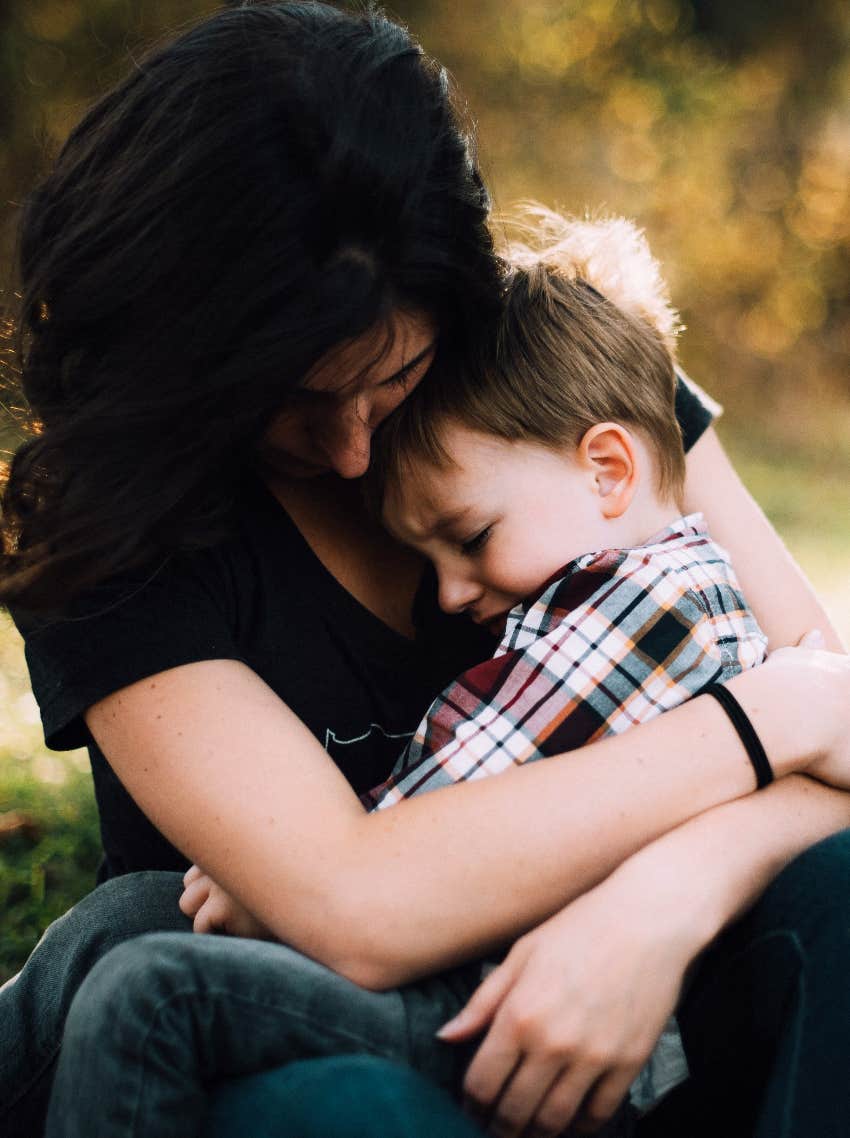Mom Shares The Genius Hack She Uses To Calm Her Toddler's Tantrums In Seconds
Other moms are thanking her for the technique.
 Tomsickova Tatyana / Shutterstock
Tomsickova Tatyana / Shutterstock Parenting is no easy task, as many can attest to. But raising a toddler seems to be where parents turn from doting guardians to desperate people willing to try anything to calm their crying child.
Luckily, one mom has figured out the perfect solution for calming her toddler down when they are in the midst of a tantrum. And because it only takes a few seconds, other parents have been quick to try it.
A mom demonstrated the 'genius' method she uses to calm her toddler in mere seconds.
The mom, a woman named Kayla, explained how she and her son work through tantrums together using self-regulating strategies.
This type of parenting has frequently been referred to as "gentle parenting," which has been met with both support and criticism from other parents. In this case, the methods that advocates for "gentle parenting" use worked successfully!
In Kayla's video, her child had worked himself into a state of distress, crying and unable to explain what he wanted or needed. Kayla stepped in to talk to him, sitting down on the floor with him and asking him to breathe deeply, then had him "shake it out," waving his arms around to dispel the energy.
Kayla then told her son "listening ears," and both she and her son pointed to their ears. She explained in the text on the video: "that way he knows he has my full attention and I have his."
After a few seconds, her son's teary eyes seemed more focused, and he was able to explain what had upset him in the first place: he wanted a specific snack, one that his mom was now able to provide. Once she explained to him that he could have a snack, he took one more deep breath, shook his arms out again, and moved on.
Many parents weighed in, praising Kayla for her technique. Some called attention to the importance of self-regulation, while others added the different strategies they use to calm their crying kids.
Kayla's hack is a great avenue through which to talk about the current debate surrounding gentle parenting.
Gentle parenting is the practice of a parent avoiding using anger to redirect their child whenever something goes wrong, instead teaching the child to understand and regulate their emotions.
This style of parenting has primarily taken off with people who felt that their own parents were cruel to them as children and, as a result, didn't teach them to manage their own emotions in the face of struggle. However, it's not something that every parent feels capable of doing, or even agrees they should be doing.
 Jordan Whitt / Pexels
Jordan Whitt / Pexels
One mother argued that entirely repressing anger as a parent may not be healthy for the child, saying, "There are people in this world who will react with anger and [my child] needs to know that... The reality is, at some point, parents will get angry with their kids."
She explained further that when her kids see her get angry, they also see her move through the anger, apologize for her actions, and then make amends with others when she messes up. This process is important for children to witness and learn by example.
Another mother wrote about her experiences in raising nine children, and how she made the switch from a rigid schedule to a looser one that relied on gentle parenting techniques. The difference in parenting fostered a healthier environment for herself and her kids; it gave her a greater peace of mind, and helped her better connect with her children.
"I slowly stopped trying to force things and allowed our days to flow," she wrote. "Does someone want to talk to me for an hour? Okay. Do kids want to play a game? Go ahead."
Creating a more understanding schedule and an environment of life experiences, rather than strict instructions and carefully managed responses, allowed for more meaningful conversations and lessons to develop naturally.
As she concluded, "I can't tell them not to yell at each other while I'm yelling. I can't tell them to talk respectfully to each other if I answer them with impatience or annoyance. I can't tell them to not hit while spanking. Life is a great teacher. You'll learn whether you want to or not."
Gentle parenting works for some parents, but every family is different.
For some, gentle parenting is a tool of freedom in opening communication in the household between parent and child. Some children respond better to this method, where self-regulation of emotions not only helps with tantrums, but can serve as an important tool as they grow up.
Studies have found that there are numerous benefits to gentle parenting, including an improved relationship between parent and child, a reduced risk of anxiety, and children receiving positive social skills in the process.
However, there are downsides to gentle parenting, one of which is making things more difficult by causing the parent to feel guilty for not being perfect.
Other disadvantages include children lacking structure and discipline, and parents potentially enabling their children. Studies have also determined that gentle parenting isn't effective for children who are aggressive or have more serious behavior.
For some parents, gentle parenting is worth the effort. Many parents, like Kayla, have used gentle parenting and, in the process, helped their children work through how they feel, without bearing the brunt of guilt or shame.
But for others, gentle parenting just isn't sustainable for their situation, especially with children exhibiting challenging behavior.
Still, it's important to remember that every family works differently, and every person will understand their needs and the needs of their children best. What matters is that you love your child and love yourself; other things will fall into place around that.
Hawthorn Martin is a news and entertainment writer living in Texas. They focus on social justice, pop culture, and human interest stories.

